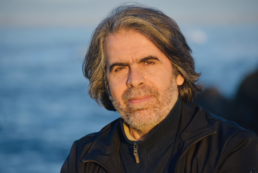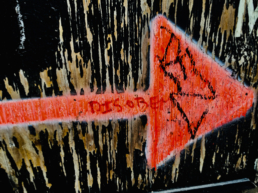Osama Esber
Language and Perspective: An Interview with Osama Esber

Osama Esber, born in Jableh, Syria, is a widely published author of poetry and short stories. He currently lives in exile in the United States. Esber has published five volumes of poetry in Arabic and has recently begun to write and publish poems in English. He has also been an active and prolific translator of works by Henry Miller, Toni Morrison, Michael Ondaatje, Noam Chomsky, Seamus Heaney, Nadine Gordimer, and Raymond Carver. Since moving to California, he has become a skilled photographer, producing powerful and unexpected images.
By Sophia Maas
You’ve translated many works into Arabic, so my first question is: Why translation? Who are you hoping to reach?
Translation, for me, is about learning. Of course we could talk about words as a source of income, but this is something else. I would like to talk about translation and how I approach it. By translating a book, for example from English into Arabic, you learn from it. You help a general readership get access to a different culture and a different experience of reading. I always learn from writers. For example, when I translated Raymond Carver’s work, I was able to understand things from a different perspective. When people talk about Carver’s work, they call his work “dirty realism.” I don’t like that term. He and other writers have opened my eyes to the richness of language. You find some people write fiction with the spirit of poetry. You find people open up to the experience of poetry. When I translate other people into Arabic I have to ask myself how they see their own world.
Writers learn from each other. I remember when I translated Raymond Carver I had a lot of feedback from other short story writers. They said it was helpful even for them to learn more about the art of short story writing. Translation for me is the noblest way to cross borders. What we know about each other comes through the media. Media is concerned with the political, and certain things don’t come through that as it can through short stories. You can gain a deeper understanding of the essence of American culture — what I consider to be creative literature — and can cross borders and get rid of prejudice and see culture through a deep lens of communication. It is a kind of understanding of one another. Translation can be defined as a deeper tool of communication.
What draws you to translate certain works and not others? What was your favorite work to translate?
This is an interesting question. Sometimes when we translate we are controlled by the market. When I was living in Syria I had a friend with a publishing house. I was at the beginning of my life as a writer, and I was studying American and English literature at university. I had access to writers who write in English, and I always like to choose a book that I like. But the question is why do you like the book? It helps you understand reality from a different perspective. Writers always talk about reality from an unfamiliar angle, and it always fascinated me. I always wanted to translate a work that moves in the same direction. I can mention two books that move in this level. One is The English Patient by Michael Ondaatje. I translated the book before it became famous, so I can say that I translated it because I like the way it tells stories in a rich and powerful way. I also enjoy a book called Einstein’s Dreams by Alan Lightman. It was written by a scientist who became a novelist. The way the book was written, by a scientific mind, has powerful imagination behind it. The language was amazing and evocative. It’s one of the reasons I choose certain books to talk about. This applies also to another publisher who bought the rights to publish the complete fictions of Raymond Carver. I translated the first book, Cathedral, because it can teach fiction writers to think of the world in unique ways. It can help writers understand the process of fiction and the creative writing that goes into fiction. These are the motives behind my choices of translation.
What do you want to say that you feel can’t be said in any way but through poetry?
For me, poetry is not about what I feel directly. What I feel personally is something personal. When we read something like T. S. Eliot or Mary Oliver we feel that the emotion expressed in the poetry is ours. It means that poetry is not about personal direct emotions but collective emotions. This means, for me, that poetry is a vision. René Char says that poetry is always a search for a word that always needs to be searched for. T. S. Eliot says, “I’ll show you fear in a handful of dust.” He talks about his view of the collapse of civilization. It’s said in a vertical way, not a horizontal way. For me, poetry is not always about the self. It is also about the other. What I want to do in poetry, personally speaking, is to be able to write and explore myself, but within a collective context in an unprecedented way. It is difficult to describe how this may happen. Poetry is about how you use language, the styles you use that no one else is using. It is about the difference in style. Compared to prose and other literary forms, poetry is a form to go beyond the norm and the known. It goes beyond the limits of a certain language. If I can talk about love in a way that no other poet has talked about or make it unfamiliar, then that is what I want to do. It is always a search for the things you are unable to say in normal language or the familiar language. No matter who reads a poem, they will find something personal in it. The personal is always in poetry, because it is your personal way of writing. That is your style. The personal is very important in poetry.
Your poetry is in both Arabic and English. How do both languages compliment or limit your artistic or poetic expression?
I originally write my poems in Arabic. I don’t write my poetry in English. As a writer I only find myself in Arabic. It is the language of my blood. I cannot write poetry in English originally. Language is about culture and the mindset through which you see the world. I see myself in Arabic. I can be more creative in it, not because it is more important than English, but because I was born there, and English is a language I have learned. I learned English because of translation. Sometimes you get a chance to be known in a foreign language, though it is not easy.
I saw that you’ve recently gotten invested in photography. What are you trying to express through photography? Is it another avenue of storytelling for you?
There’s a story about my interest in photography I would like to tell you. In 2013 I was living in Chicago and I was invited by the Italian renowned artist Marco Nereo Rotelli who had an installation at the time called Light and Sound. The idea was to transform the facade of the Field Museum in Chicago into a poetic image of Dante’s Divine Comedy. He invited a number of poets to write poems inspired by the Divine Comedy. I wrote a poem about the Syrian war and the hell it created, and when we met later for dinner, he looked at me and told me that I should take photographs and write poems about them. He talked about the relation between poetry and photography and writing poems inspired by photos. I started trying and I found that I related to photographers. I started looking at the visual world in a different way. Anyone can take a photo now. Anyone can press a button. But that is not photography. To take an artistic photograph there is an inspiration, something I can’t define in realistic terms. I can’t see it in the normal state of walking around. Capturing a good photograph is like writing a poem. It is a fleeting thing that you have to capture. In photography, like poetry, there is inspiration. It’s more technical, but it’s still about inspiration. I believe the most important thing about photography is the eye and how it sees things. I’m working on a photographic project about Chicago. You are a wanderer with your camera, you think of things as a photographer. I’m planning my next exhibition and working on it. On my Facebook, when I post a photo, I also write a poem about it. Photography has helped me in a way move away from trying to rationalize things logically. The photograph has saved me from being trapped under the influence of great literary giants. It helped me see poetry in a different way.
What do you find most inspiring about your current work in progress?
What I find interesting and inspiring is the struggle to achieve it. I’m working on poems right now that I feel needs more work. There’s a feeling of imperfection that motivates you and makes me excited about going back to rewrite. There’s a lot of confusion, but when you work, it starts to make sense. Arabic has a tradition going back more than two thousands of years of poetry being a high status symbol. To have a foothold here, to be regarded as a good poet, is something that happens after a long process. You have to struggle with language, you have to write and rewrite. This process makes the magic of writing, and that’s what I think is interesting about it. Something else, now that I live in the United States and my country is too far, this feeling of distance is also very interesting. It helps me see things in a different light that I was unable to see when I was living in the culture.
What keeps pushing you to create?
It’s the feeling that the great book that I’m dreaming of is not written yet. In a sense, writing is an act of searching for perfection. But writing is always related to imperfection. When you write a poem or a book you ask why because you always have more to find that you haven’t expressed before. What evades me is the perfect book. I look at what I’ve written and I think that it’s not what I want. It creates a justification for the act of writing for me.
Why do you think people should keep trying to tell stories or write poetry?
I like this question a lot, actually, so I’ll tell you a story. A famous Arabic book, Arabian Nights, tells the story of the king Shahryar. The king, after discovering his wife has been unfaithful, kills her, and kills those whom she had been unfaithful with. He starts to hate women because of it, marrying and killing a wife each day until there are no more candidates. The minister in charge of marrying the king has two daughters, one of whom is trying to get the king to stop killing his brides. She devises a scheme and convinces her father to marry her to the king. She crafts a story of something she continuously works on, and the king decides not to kill her because he is interested in what she’s creating. She tells interesting stories, yet always keeps them incomplete. I think this is about the power of telling stories. They can prevent death or delaying it. We should keep telling stories to overcome our fear of the unknown, or to enrich life, or to discover the deep parts of ourselves. We travel through deep parts of ourselves. It is a way of creating deep connections between cultures. Here, also, is the importance of translation as well as telling stories.
Sophia Maas is the 2021 In Process intern. She is preparing for her graduation while carving out the time to help new writers develop self-confidence, create her own stories, and find inspiration in more experienced writers.
August 11, 2022
Saviors of the Nomadic Spirit
Osama Esber is a Syrian poet, short story writer, photographer and translator who presently lives in California. He is an editor in Salon Syria, Jadaliyya’s Arabic section, and an editor in Status audio magazine. Among his poetry collections are: Screens of History (1994); The Accord of Waves (1995); Repeated Sunrise over Exile (2004); and Where He Doesn’t Live (2006). His short story collections are entitled The Autobiography of Diamonds (1996); Coffee of the Dead (2000); and Rhythms of a Different Time (in process). He has translated into Arabic works by Alan Lightman, Richard Ford, Elizabeth Gilbert, Raymond Carver, Michael Ondaatje, Bertrand Russell, Toni Morrison, Nadine Gordimer, and Noam Chomsky, to name a few. He attended the international writing program in Iowa in 1995.
By Osama Esber
Writing as a creative art, in its essence, is an act of immigration. This is because a creative artist always searches for a new way to express his or her vision in a new form. This act of searching means that the poet migrates from the familiar to the unfamiliar, from tradition to the horizon that his individual talent expands The process of creative artistic experience is defined by this act of migrating.
The manifestos of great literary movements have always endorsed the desertion of outmoded, traditional, and inherited forms, and the pursuit of novel, innovative means of expression. Nevertheless, new creative forms were always received with suspicion; they were censored or burned, rejected or confiscated in a similar manner to how refugees or immigrants were stuck at borders, isolated in ghettoes, looked down upon, or discriminated against.

The great modern cities and civilizations were built by immigrants or by invaders who became settlers after massacring or marginalizing natives. Nonetheless, this act of invasion, of colonization, is not the topic at hand. What I want to emphasize is that the act of immigration inhabits our entire human endeavor and has defined it since the beginning of creation. Even in religion, the first man migrated (as a result of exile) from the heavens, wearing the mask of the fall, or the first sin.
We have been immigrants since our ancient African ancestors decided to find a haven in which humankind could continue to prosper. Modern anthropology, according to Bill Bryson in his book A Short History of Nearly Everything (Broadway Books 2003) was built around the idea that humans emerged from Africa in two waves. Scientists argued that people have long been migrating and sharing genes as well as information. But humans, who are immigrants in the existential sense, have become citizenry with privilege and power, and have given up their previous role as the saviors of migration as a creative option to enrich and prolong human endeavor. To satisfy their egos, they built refugee camps, regarded immigrants as numbers, taxpayers, or voters and created programs for refugees and asylees, funded fences and walls, created humanitarian relief agencies, and became donors or symbols of charity. Power is highly skillful and cunning in crafting and donning masks.
For the current power structures that dominate the world, Africa, the continent from which the first immigrants left, was only a source of slaves and refugees, epidemics and mines; Arab countries are markets and oil wells; Latin American countries are the spring of cheap labor and the dump for industrial waste. Inhabitants of other countries and the children of other cultures were not allowed to taste the bread of modernity, but sometimes were allowed to eat the crumbs that fell from the tables of their supposed masters.
People feed on oblivion and develop a short memory, a memory that betrays history and experience. People forget that they have been immigrants since the first humans migrated to a new place. We live in an age of disconnection and isolation. Politics, as practiced in the world, continue to pave the way for disaster. The gap between misery and privilege expands, technology still under the control of Cain, the slayer of his brother. The story originated and continues from a crime that has disguised itself as progress. Brothers have forgotten that they are related, blinded by greed and the desire to dominate nature.
The human nest, the only haven for us, we the migratory birds of creation, has been disturbed. New developed powers of evil and darkness have been released. The main concern, as usual, has been what should be done to make businesses thrive and large companies continue to operate. We should give money to people so that they can make purchases. The market should not stop. Consumers should remain activated. Concern for the market’s continuous immunity has required taking care of human subjects.
In the Arab world, where the future is as murky as London’s fog, governments behave as if there is no epidemic. Money is not for taking care of people; money is for buying from the West more gears to control people, or for depositing in private Swiss banks.
In the beginning, regimes were relieved by the pandemic. The dark forces of nature were in the service of despotism and autocracy; no one dared to assemble or to go out onto the streets. But as despair continued to reign, and corruption soared to new heights, people challenged the pandemic as well tyranny, and went out to protest because their livelihoods had been stolen and they were deprived of a life with dignity and respect in the miserable cities of the Middle East. These are cities without hope, where one can “show you fear in a handful of dust,” as T.S. Eliot stated in The Waste Land, or in any face. This is not only the fear of losing your job that Eduardo Galeano discussed in his book Upside Down: A Primer For the Looking-Glass World (Metropolitan Books 1998), but also a fear of losing your meaning and purpose, of reaching a point where you find yourself chanting T.S. Eliot’s lines in The Hollow Men, “We are the hollow men/the stuffed men.”
Living in the West is no longer as it was. It may not be as promising as before. It is no longer a rosy dream, contrary to what lines of people at the gates of foreign embassies in the Middle East or at border crossings, or anywhere, think.
Once upon a time, and a good time it was, Arab writers used to visit Western capitals and return to talk about the wonders of modernity, philosophical theories, and great literary and intellectual movements, but now Arab writers come to stay, not to return and tell their stories like the great travelers of old times. They run away from tyranny and bring with them their countries in a metaphoric form, recreate them in language or in dreams, and live in an imagined geography, while in the real geography of isolation they face a double estrangement: They become separate from their roots and victims to a culture of fear, expressed by the established citizenry, who have forgotten their roots, their essence as immigrants who built civilization.
When drought afflicted Syria it led, along with much else, to a tide of uprisings, where the poor and downtrodden went out onto the streets demanding bread, water, and freedom. Now, those who did not die there under bombardment have become immigrants, refugees in neighboring countries where racism bares its teeth. Many of them live forgotten in tents at the borders, while scores of others are under the threat of deportation, which makes evident the narrow limits of human solidarity.
In the light of all this, writers, poets, and artists, the saviors of the nomadic spirit of the human race, should always be ready to forge again- borrowing from James Joyce- in the smithy of their souls the uncreated conscience of their races. They should enlighten their people to the fact that there is only one race on this planet, whose short experience, or journey in a caravan of various magical colors, may come to an end, whose migratory spirit may extinguish and may not find another place to reemerge. It is time to dismantle the barbed wires of our hearts. Climate change and its implicit and explicit dangers should make us think of immigration in a creative way. But the big question is: When our poor planet becomes unable to sustain life, will there be any future anthropologists to discuss another migration?
Cities That Visited Me*
-1-
I saw dolls on your streets
becoming women
and despair stumbling along
like the feet of Syrian workers.
-2-
Sometimes your banks
inject the day’s veins with hope.
Sometimes your dawn
breathes in the smoke of words.
-3-
Your TV channels told us
of other doors,
but when opened,
they only led to another room
in the same house.
– 4-
I saw you a bridge
hanging in the void of your myths
and Mediterranean illusions.
-5-
In your cafes
modernism is smoked
like Cuban cigars,
their leaves smoothed on the thighs
of a professional moment
in a prostitute’s dress.
-6-
I saw books get botox
to seduce their readers.
Your newspapers do not read your mind
your cafes do not change
the wheels or the oil of their language’s engine.
Billboards in your streets wear
naked thighs and bosoms
that relax on sandy beaches.
In their bronze complexion,
we read about a future
that immigrated to other countries.
-7-
The difference in the value of foreign currency
assumes the job of angels
and opens momentarily the doors of paradise.
-8-
I see your face
on an airport’s electric door,
or on a passport stamp,
from which two eyes,
on whose balcony police dogs sit,
look.
-9-
Beirut,
where the borders cross
I saw men made of barbed wire
imprisoning the horizon
inside the pupils of their eyes.
-10-
You are visiting me now,
I wish I could settle you in my language,
I wish I could give you a room
and invite you to a glamorous evening.
I wish I could let you lie naked
on my bed between my arms.

Beirut,
you do not need to forgive me,
I do not fall in love easily with Arab cities,
watching their bellies dancing
with the belt
of death, poverty, tents, and slums
wrapped around their naked waists
does not excite me.
The clock lost its handles.
It looks featureless,
like your soul,
it has lost the road to a body.
* From a divan in process with the same title.
August 11, 2022

